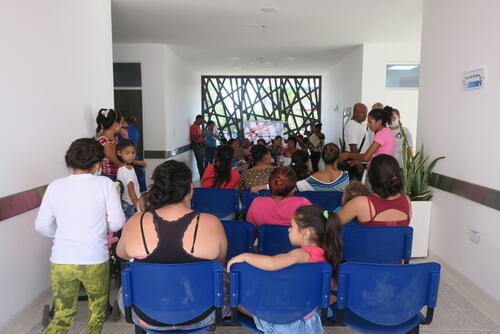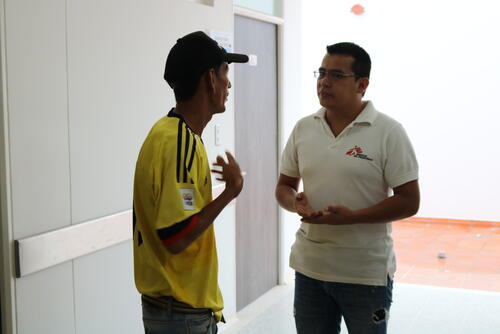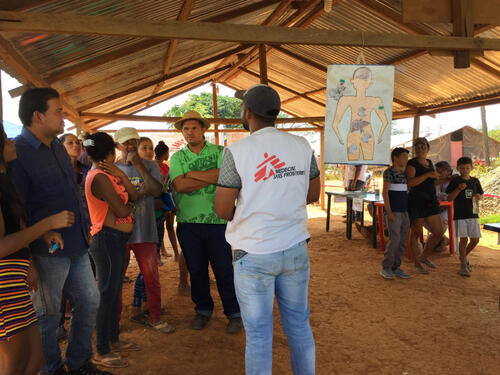Médecins Sans Frontières (MSF) recently began working in Riohacha, in the department of La Guajira, far northern Colombia, to meet the health needs of Venezuelan migrants, Colombians returning from Venezuela, and local people who lack health care. We are also continuing to provide care to Venezuelan migrants in the border areas of Norte de Santander and Arauca, Colombia.
In Riohacha, we provide outpatient care in Hospital Nuestra Señora de los Remedias and will soon begin mobile clinics in urban and rural areas around the city, offering primary health care, family planning, mental health care, and information on social services for migrants.
“In these first days, we have prioritised providing pregnant women with prenatal care,” said Elsa Soto, MSF project coordinator. “The patients that we have seen are all Venezuelan, and most of those who are pregnant have not received prenatal care before, in their second trimester of pregnancy. This is concerning, because prenatal care is essential to prevent and screen for complications and illnesses.”
Patients have come from Riohacha as well as rural areas and neighbouring towns.
The hospitals in Venezuela lack nurses, and they lack many resources.Carla M, Venezuelan migrant in Tibú, Colombia
In 2018, an MSF emergency team responded several times to the needs of people arriving in the department of Norte de Santander, which borders Venezuela. Since November 2018, we have also opened clinics for the migrant population in hospitals and health centres in the cities of Tibú and Puerto Santander, and in the district of La Gabarra. Since January 2019, MSF opened clinics in Tame, Saravena and Arauquita, in the department of Arauca.
In these clinics, we provide primary health care for children and adults, mental health care and sexual and reproductive health care, including pre- and post-natal care, family planning, and termination of pregnancy.
An MSF team in Tame is focusing on treating people walking over the border from Venezuela into the Arauca area, more than 1,000 of whom enter Colombia each month, on their way to other cities in Colombia or neighbouring countries.
During the first three months of 2019, our teams have carried out more than 9,800 medical consultations for migrants in border areas of Colombia, 40 percent of which were for children under five years old. Nearly 2,300 consultations were for family planning, and 71 were for termination of pregnancy. Such figures indicate an urgent need to expand access to medical care for Venezuelan migrants and refugees, especially for sexual and reproductive health.

“The pathologies that we are seeing in the clinics in Norte de Santander and Arauca are skin conditions, respiratory tract infections, musculoskeletal conditions, urinary tract infections and gynaecological conditions,” said María José Usach, MSF medical coordinator in Colombia. “In addition, we’re also seeing chronic diseases that were not adequately treated in Venezuela.”
These health conditions are often aggravated by the precarious living conditions of Venezuelan migrants and refugees. Psychological care is also very important because migration can profoundly affect a person's daily life and sense of dignity. So far this year, our psychologists have treated 450 people, whose symptoms often include anxiety or depression.
“The massive arrival of Venezuelans in Colombia has overwhelmed the local capacity to respond,” said Ellen Rymshaw, MSF head of mission in Colombia. “The Colombian health system cannot cope by itself with the needs of the roughly one million Venezuelans who are estimated to live in the country, so international funding is essential to ensure adequate access to health care.”
Insecurity is also a concern for people in the border areas, as criminal groups and elements of the National Liberation Army (ELN) and People's Liberation Army (EPL) are known to operate there.
“Clashes and other violence related to the presence of different armed actors in the border areas of Arauca and Norte de Santander affects a large part of the Venezuelan population and makes the delivery of aid to rural areas more complex,” Rymshaw said.
The massive arrival of Venezuelans in Colombia has overwhelmed the local capacity to respond. The Colombian health system cannot cope by itself with the needs of the roughly 1 million Venezuelans.Ellen Rymshaw, MSF head of mission in Colombia.
Access to medical care and other living conditions have deteriorated in Venezuela due to acute political, economic, and social crises, leading more than 3.4 million Venezuelans to leave the country in recent years.
Carla M., 32, who arrived in Tibú in late 2018 with her three children, described how they left their home in Ciudad Ojeda, Venezuela, when they could no longer afford to eat three meals a day.
“We had already reduced rations to the maximum, we had already sold everything, the fridge, the furniture,” she said. “I used to work selling groceries in a shop, then as a street vendor, but now I had nothing to sell. The salary of my husband, a worker in Petróleos de Venezuela (PDVSA), was no longer enough for us to buy food.”
Carla and her family currently live in a makeshift tent on a plot of land in Tibú, and she takes her daughter to the MSF hospital for treatment for a skin condition.
“The hospitals in Venezuela lack nurses, and they lack many resources,” she said. “There were no vaccines for the little ones, or not all the necessary doses, or they did not reach everyone.”
MSF has been working in Colombia since 1985 and currently works in five areas: La Guajira, Norte de Santander, Arauca, Buenaventura and Nariño, where MSF has an emergency team.






